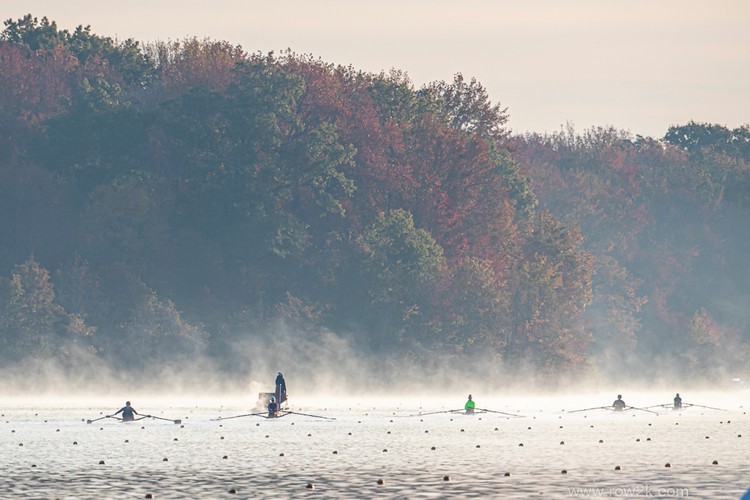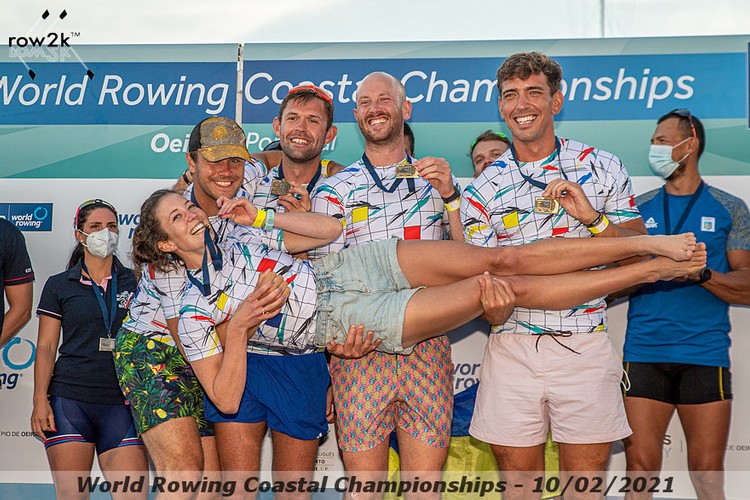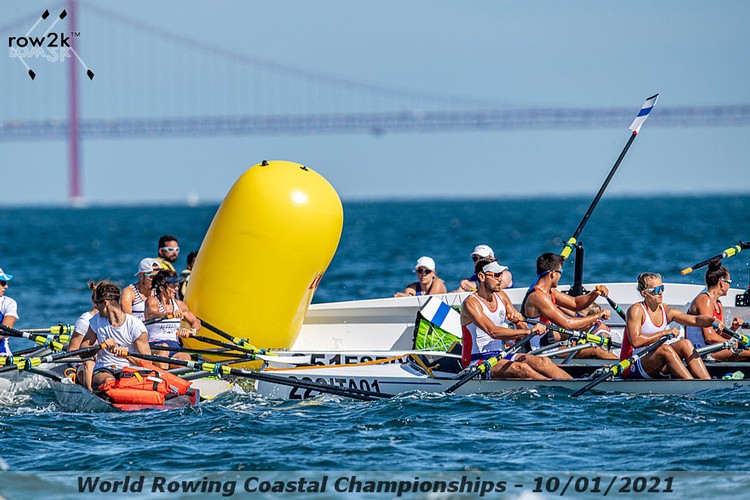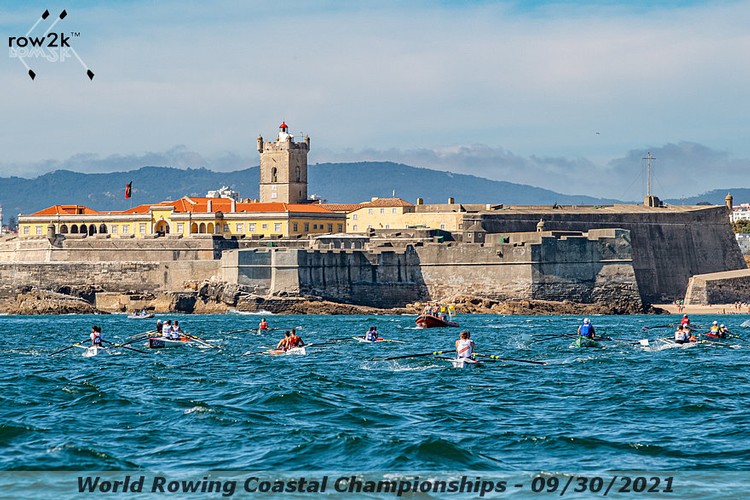
Traditionally, the first Fall Speed Order after an Olympics serves up a host of fresh faces and marks the start of a full four year run-up to the next Games, but in this Fall of 2021, the Fall Speed Order was an altogether different kind of beast.
There were newcomers and folks who just missed out on Tokyo, to be sure, and there was the notable lack of a few of the big names from the last cycle, or two, that you see at the start of any new Quadrennial-like Gevvie Stone and John Graves.
Yet, also in this mix were a few folks who have already used the extra year before Tokyo to make a mark, most notably ARION's Kristi Wagner, who is already a returning Olympian thanks to an ascendant 2021 which earned her a spot in the Olympic double, and a raft of athletes in the Men's Single who were 2021 Trials winners in the non-qualified events, like the Men's Quad and Double, and have already raced abroad for the USA.

Added to this was a novel format that mixed an old-school stake race with a full-on 2000 meter race in doubles--with a start!--based on the finish order from the morning, making for a Speed Order which served up a new take on the traditional end-of-fall, start-of-cycle speed check for the elite rowers. In fact, with the Friday 6k erg starting things off and setting the 1x starting order, being flexible and able to race multiple distances was key, especially for the scullers.
As Green Racing Project's Jacob Plihal pointed out: "a large part of this regatta was all about being agile and adaptable to three different types of rowing: the erg, the 1x, and then the 2x."
For all of that, top 4 finishers morning to afternoon was remarkably consistent, wholly so on the women's side, with Green Racing Project's Emily Delleman winning both legs in the morning, then teaming up with Wagner to win the 2x, while her GRP teammate Grace Joyce took 2nd and 4th in the 1x and then partnered with HOCR Champ Maggie Fellows-3rd overall in the time trialling--to take 2nd in the double "final" at the end of the day.
The men's ladder had a bit more movement: while overall winner Sorin Koszyk from the Penn AC and Kevin Cardno from Texas Rowing Center were in the top 4 throughout, both Finn Putnam (Penn AC) and Will Legenzowski (GRP) used a strong 1st 1900m to finish 2nd and 4th overall, despite taking 7th and 6th on the way home into what turned out to be the headwind leg. With Koszyk sitting out the doubles' round, it was GRP's Jacob Plihal, in 5th overall, who earned a spot in the top 2 doubles; he overcame running 9th on the first leg by taking 4th on the second 1900 meters to move up.
In addition to the scullers, there was the option to race pairs and six of the women went that route, including Central Oklahoma grad Brooke Wolford, who took 3rd on the 6k erg and then hopped into the pair with Vesper teammate Charlotte Forman.
The pair was also the focus for Oakland Training Center veterans, and Olympians, Nick Mead and Alex Karwoski. Their pair turned out to be the only Men's entry, so they did their work on the race course Saturday uncontested, while the Women's Pair from the Princeton Training Center--Kelsey Reelick and Allyson Baker--had a mostly drama-free run, taking the time trial by healthy margins on each leg before walking away with the afternoon 2k over Wolford and Forman to sweep the day. They were the only official Training Center entry out on the lake this time around.
Also racing uncontested but sticking to the training that took her to the 2021 Paralympic Trials was CRI's Jennifer Fitz-Roy, who rowed the PR2 1x here this weekend.

After the dust settled on these four hard pulls in 24 hours or so, row2k caught up with some of the top scullers on the day to get their take on the "3 year Quadrennial," the race format, and doubling into those doubles.
New Quadrennial, Mid-Quadrennial, ???
With Paris 2024 less than 1000 days away and, as M2x winner Finn Putnam pointed out, just one Worlds to go before Olympic bids are on the line at the 2023 Championships, one of our first questions was: "Does this feel like the start of a quadrennial, or mid-quadrennial?"
Kristi Wagner
"It feels like both the start of a new quadrennial and like we are closer than I realize to the next Olympics. Coming back from Tokyo, I've tried to mentally reset as much as possible, while keeping my body happy and in shape. In Saratoga, I have a lot of enthusiastic, young teammates, which has been extremely helpful in making practice fun and something I want to be a part of.'
Will Legenzowski
"I'm not super experienced about the old quadrennial system, but [it feels] pretty early to me, just based on how many guys there [from] so many different backgrounds. The fact that there was 45 scullers felt very much like, alright: John Graves is retired, who is going to have a shot at filling those shoes. It felt like a good place, for me personally, to start, and I'm assuming other guys felt the same."

Maggie Fellows
"This is a pretty strange time for a lot of people and I think many are questioning how to move forward. To me it feels like the start of a new quadrennial and there are a lot of changes that are happening as well as new talent looking to maximize opportunities. I have been focused on training this fall and looking to enjoy rowing/racing which is why I am training in the first place."
Emily Delleman
"For me personally it does feel like the start of a quadrennial. I was a 2020 graduate and Olympic Trials was my first exposure to racing at the senior level. I think getting that initial experience under my belt this past spring helped to frame what it would take to accomplish my goals through this next quadrennial.
The calendar was strange this past year with peaking for both Olympic Trials and for what would have been Trials for the Senior World Championships. However with me personally being on the younger side I think it was helpful to get in as much experience as possible and have the structure of focusing on the preparation for those races."
About that Turn . . . the "Two-by" Format
The meat of the on-water portion was, in essence, a stake race: 2x1900m with a 180 degree turn. That format basically allows for Mercer Lake-and its timing points at 100 meters and the Finish Tower-to sub in for the old 4.5k course used when the Fall Speed Order was run on Lake Carnegie, but this "two by" definitely fell somewhere between a continuous head piece and a pair of separate efforts, so we asked folks how they approached the piece(s):
Finn Putnam
"[The format] was challenging, but everyone was hurting, so there was comfort in that. The 2x2k format was different but I kind of liked it. My approach was to pace it a little better, but sometimes that doesn't happen."

Kristi Wagner
"The 2x2k was an interesting change, and I'd be lying if I said I didn't miss the traditional Carnegie 4.5k, but I've learned to be open to new opportunities. I will say that I wish the turn had been counted in our time, being able to successfully maneuver your small boat is a necessary skill if you want to compete at the highest level."
Emily Delleman
"It was difficult to decide how to execute the 2x2k because my thought was to initially approach it around head race pace, however it is a bit shorter and less technical since we are on a buoyed course, so I chose to go closer to a 2K pace without the starts/sprint/moves and hoped to conserve enough energy."
Sorin Kosyk
"It's only like 20 seconds when you spin, so you're turning the whole time and there's not really any rest. I approached as I would any other head race, but you get a little added benefit that you can kind of reset the rhythm coming out of the turn. But other than that, just the same way I would do any other head race. When I was at Cornell, we would do a buoyed 2500 meter stake race every weekend in the fall. So that definitely helped me; I knew exactly what I was getting into."

Kevin Cardno
"For the 2x2k you just have to pick a pace and rhythm, make it feel good in both directions."
Will Legenzowski
"I really went for it on the first half, and I didn't blow up, but I was definitely a bit slower on the way back. I just tried to turn as quickly as I could, and try to not treat it like a rest. I just wanted to keep the engine running and go and do it. Like it's a head race like we've been doing all fall."
Grace Joyce
"The 24-hour layout reminded me of collegiate training in some senses. There are some weekends where you're putting out multiple maximal efforts, compartmentalizing then working to play the recovery game to your advantage. I worked to race the 2x2k as two 2ks instead of a 4K piece."

Back "2" It . . . Hopping in Doubles
Kevin Cardno, who picked up the win with Putnam in the men's double to end the day, probably put it best when it came to summing up this part of the racing: "It felt like a school yard pick 'em race."
Despite the short notice and whole practice-on-the-way-to-the-start vibe, all the scullers we spoke with agreed this was the fun part of the weekend.
Emily Delleman
"It was surreal to jump into a boat with Kristi [Wagner] as she and many of the 2021 Olympians have been such a strong source of inspiration through my training this past year. I was a bit nervous going in, but wanted to be as calm and collected as possible so we could find a rhythm. Kristi immediately put me at ease with her confidence and kindness, plus she is incredible at matching. We then had a really fun race against my teammate Grace Joyce and Maggie Fellows where we traded bow balls down the entire course.
It was a great way to develop a gritty racing mindset and be adaptable. We all agreed that even after a long weekend it was a fun experience and we were all missing side by side 2ks."
Grace Joyce
"Doubles racing was unreal. Getting to jump in a double with Maggie Fellows and working to match her rhythm is an experience I'll never forget. She is a legend in the sport and someone I look to as a role model. This weekend really tested a wide range of skill sets, adaptability being one of them. The bulk of the race was well executed; I was just working to fit Maggie's stroke as efficiently as I could, as quickly as possible. "
Finn Putnam
"This fall I've only been in the single, so it was really great getting to jump in a team boat again and work with someone to make the boat move."
Kevin Cardno
"I really enjoyed it. Short notice and a good challenge to row with someone new. The most fun I've had racing in a while. No expectations and a great learning experience. Finn and I had a really shaky start, but hit a solid rhythm that carried us through. Can't ask for more than that."
Jacob Plihal, on the fact that his lineup, as it happens, was one that had actually rowed a few times before
"Will [Legenzowski] had joined us on our training camp in Florida leading up to Olympic Trials I early in this year, and we had the opportunity to row the double together 3 or 4 times, so having a pre-existing, albeit small, foundation of chemistry between us was definitely helpful today. Will has been training full time with Brown University, so it was definitely great to see him piece together a really strong performance after switching over to sculling for the weekend."
Will Legenzowski
"I rowed with Jacob before in the double, in that same configuration. Granted, I was sculling a lot more when we did it, so it was a little weird jumping into it, but we have a pretty similar stroke and a pretty similar racing philosophy, and we came out with a pretty solid race."

Comments | Log in to comment |
There are no Comments yet
| |
If you enjoy and rely on row2k, we need your help to be able to keep doing all this. Though row2k sometimes looks like a big, outside-funded operation, it mainly runs on enthusiasm and grit. Help us keep it coming, thank you! Learn more.
- Bont Rowing
- Calm Waters Rowing
- Concept 2
- Craftsbury Sculling
- The Crew Classic
- CrewLAB
- Croker
- Dad Vail Regatta
- Durham Boat Co.
- Empacher
- Faster Masters
- Filippi
- Fluidesign
- h2row.net
- HUDSON
- Live2Row Studios
- Nielsen-Kellerman
- Oak Ridge RA
- Peinert Boat Works
- Pocock Racing Shells
- Race1 USA
- Rockland Rowing Masters Regatta
- RowKraft
- Rubini Jewelers
- Vespoli USA
- WinTech Racing
- Bont Rowing
- Calm Waters Rowing
- Concept 2
- Craftsbury Sculling
- The Crew Classic
- CrewLAB
- Croker
- Dad Vail Regatta
- Durham Boat Co.
- Empacher
- Faster Masters
- Filippi
- Fluidesign
- h2row.net
- HUDSON
- Live2Row Studios
- Nielsen-Kellerman
- Oak Ridge RA
- Peinert Boat Works
- Pocock Racing Shells
- Race1 USA
- Rockland Rowing Masters Regatta
- RowKraft
- Rubini Jewelers
- Vespoli USA
- WinTech Racing










